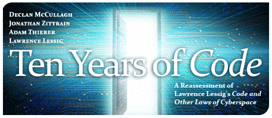Lead Essay
Journalist Declan McCullagh offers a mixed assessment of Lawrence Lessig’s Code and Other Laws of Cyberspace: Although Lessig was right that preserving individual liberty on the Internet is important, and although he was right to note the crucial importance of infrastructure and basic rulemaking in preserving individual choice, Lessig was mistaken in at least two ways. Lawmakers haven’t lived up to Lessig’s high expectations, and the “threat” of commercialization has largely failed to materialize.
Response Essays
Jonathan Zittrain argues that the differences between Lawrence Lessig and Declan McCullagh aren’t really ideological. They’re about process and approach. He personally finds much common ground with cyberlibertarians, but also believes that a great deal of effort must be put forth to create institutions that will preserve an open Internet. Neither the government nor traditional, market-based firms are necessarily well-suited to the task.
Adam Thierer condemns Lessig’s Code for its pessimism and inaccurate predictions. Where Code predicted that the future would consist largely of online “walled gardens” offering total corporate control, the walled-garden model has proven a failure. Lessig has recently claimed that he is even more confident today of the predictions he made ten years ago; Thierer doubts whether any evidence supports him. Thierer views Code and the intellectual movement it spawned as essentially one that justifies government control where no such control is warranted. He laments this movement’s growing influence.
Lawrence Lessig is happy that many of the bleaker predictions of Code have not come to pass. This is not to be taken, however, as a sign that freedom is easily gained or kept. It took an enormous amount of work on the part of many theorists, activists, coders, and lawyers to preserve liberty on the Internet. If Code looks wrong in hindsight, we have them to thank. Yet new threats loom large today, and Lessig in particular praises Jonathan Zittrain’s The Future of the Internet and How to Stop It as a warning to a new generation seeking to preserve liberty on the Internet. Future activists will have to continue the work of preserving freedom, because, he concludes, democratic government often isn’t up to the task.
The Conversation
Related at Cato
Issue Area: Telecom, Internet, and Information Policy

